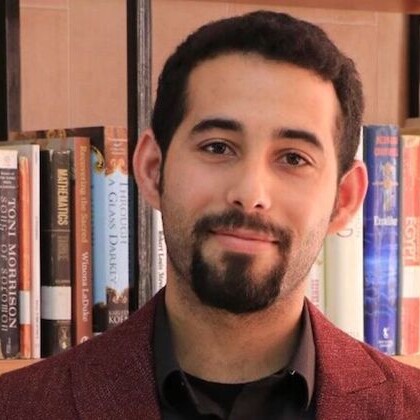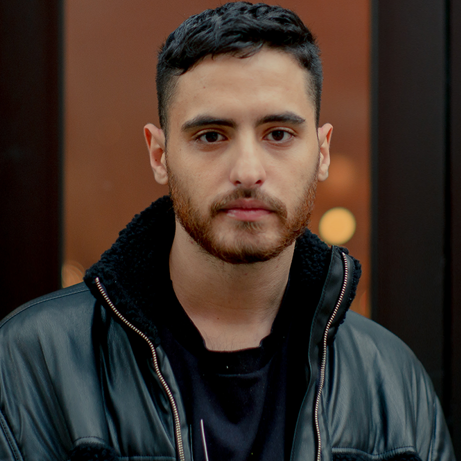Mosab Abu Toha In the New Yorker, poet Mosab Abu Toha describes fleeing his home in Gaza with his family and being detained, stripped, and beaten by Israeli forces. Toha writes of the future, “I hope that when the war ends I can go back to Gaza, to help rebuild my family home and fill it with books. That one day all Israelis can see us as their equals—as people who need to live on our own land, in safety and prosperity, and build a future.” Amy X. Wang remembers teacher and poet Louise Glück, who died in October.
Masha Gessen. Photo: © Lena Di New Yorker staff writer Masha Gessen discusses the controversy over the awarding of this year’s Hannah Arendt Prize for Political Thought with Amy Goodman at Democracy Now. Gessen received the prize in a postponed and scaled down ceremony on Saturday after the prize’s sponsor, the Heinrich Boll Foundation, withdrew its support in response to Gessen writing in the New Yorker that Gaza today is “like a Jewish ghetto in an Eastern European country occupied by Nazi Germany.” At Jewish Currents, Nora Caplan-Bricker reviews Isabella Hammad’s new novel Enter Ghost. The novel follows Sonia
Nadia Taha For The Nation, Nadia Taha writes about the dangers faced by Palestinian journalists in Gaza. Taha notes that at least sixty-three journalists and media workers have been killed so far since October 7th; fifty-six have been Palestinian. Taha observes, “Local reporters in other conflicts around the world have been lifted up by the journalistic community. The journalists of Ukraine, for instance, were awarded a special Pulitzer Prize citation for their bravery in war. The very least that those of us can do now is bring that same level of solidarity, attention, and gratitude to the journalists of
Refaat Alareer Palestinian poet and professor Refaat Alareer was killed in Gaza last week by an Israeli airstrike alongside six family members. TIME has published a collection of transcribed voice notes Alareer sent them last month. In one, he talks about the extreme lack of food and water in Gaza: “I personally lost like five kilos, but I don’t care. I can eat one date for 10 or 15 hours. I’m a young man. But how would you tell a kid they can’t eat, they can’t have what they want, they can’t drink enough? I keep telling my kids,
Louise Glück. Photo © Katherine Wolkoff The Fall 2023 issue of Bookforum is out now, with essays by Justin Taylor, Audrey Wollen, Hanif Abdurraqib, Leo Robson, Jane Hu, Michael W. Clune, Blair McClendon, Laura Kipnis, and much more. Subscribe today to support what we do, and consider making a donation or gifting a subscription. Unionized workers at the Washington Post are planning to strike on Thursday to protest cuts to staff and call attention to management “refusing to pay us what we’re worth or bargain in good faith.” Contract talks have been ongoing for eighteen months. The Washington Post
Sasha Frere-Jones. Photo: Heidi DeRuiter. Tonight in New York, Ninth Street Studio will feature Aaina Amin, Jen Elias, Abou Farman, Sahar K., H. Sinno, and others reading The Gaza Monologues, a project begun in 2010 by more than thirty young people for the Palestinian theater ASHTAR. ASHTAR is asking theaters around the world to perform the monologues today. The New York event is being put on by Movement Research, Performance Space New York, Mabou Mines, and Writers Against the War on Gaza. PDFs of the monologues are available in multiple languages on the Gaza Monologues site. In an entry
Mohammed El-Kurd In this year’s Edward Said Memorial Lecture at Princeton, published in The Nation, activist and poet Mohammed El-Kurd discusses Said’s 1984 essay “Permission to Narrate,” which critiques how Western coverage of the Israeli-Lebanese War was biased toward the Israeli narrative and suppressed the Palestinian point of view. El-Kurd identifies a similar situation at hand today, with Western mainstream media creating a false dichotomy in which Palestinians “are either victims or terrorists” and only deemed sympathetic if they are “perfect victims.” Countering this, El-Kurd writes: “We are human not just because we cry when we lose our mothers,
At AnOther magazine, an interview with Jackie Wang, whose new book Alien Daughters Walk Into the Sun was just published by Semiotext(e). Wang says of her process, “Usually, I’m just obsessively collecting quotes, writings, fragments, meditations, and not even thinking that it’s for anything. It’s almost like I have to go behind my back to get writing out.” Wang will appear in conversation with Janice Lee at Powell’s Books in Portland on December 8th.
Mosab Abu Toha. Photo: City Lights Mosab Abu Toha, a Palestinian poet from Gaza and winner of the American Book Award, was detained and reportedly beaten by the IDF after being stopped with his family at a military checkpoint on Sunday while trying to cross the border into Egypt. He has since been released in Gaza. Diana Buttu, a former PLO spokesperson and family friend of Abu Toha’s, has said that he is now with his family, and told the New York Times that “he was likely freed because of public pressure, including from publications like The New Yorker
Anne Boyer Anne Boyer—the author of the poetry collection Garments Against Women, the essay collection A Handbook of Disappointed Fate, and the nonfiction book The Undying—has resigned from her position as poetry editor at the New York Times Magazine, stating: “The Israeli state’s U.S.-backed war against the people of Gaza is not a war for anyone.” She also writes: “I can’t write about poetry amid the ‘reasonable’ tones of those who aim to acclimatize us to this unreasonable suffering. No more ghoulish euphemisms. No more verbally sanitized hellscapes. No more warmongering lies.” The winners of the 2023 National Book
Lexi Freiman The National Book Awards are tonight at 8 pm Eastern time. The event, hosted by LeVar Burton, will be streamed live on YouTube and Facebook. Ahead of the event, two sponsors have withdrawn their participation after learning that some of the awardees would likely address the war in Gaza. The National Book Foundation released a statement: “Political statements, if made, are by no means unprecedented in the history of the National Book Awards, or indeed any awards ceremony. We are working with the venue to ensure a safe environment for all our guests. We of course hope
Jazmine Hughes and Jamie Lauren Keiles on Democracy Now!, November 14, 2023 Former New York Times Magazine staff writer Jazmine Hughes and contributing writer Jamie Lauren Keiles speak with Democracy Now! in their first broadcast interview since resigning from the publication after signing an open letter published by Writers Against the War on Gaza. n+1 has published a collection of voice memos from Gazans, transcribed and translated by a group of volunteers in New York City and Chicago. “I’m six wars old,” said Sahar Kalloub on October 22. On October 13, 10-year-old Salma Alghalayini said: “It’s so hard, but
Prudence Peiffer. Photo: Charles Fulford. In The Nation, a remembrance of activist and lawyer Ady Barkan, who died of ALS last week at the age of thirty-nine. As Sarah Johnson and Brad Lander write, Barkan did not let his diagnosis slow down his activism: “He recognized that his own story, his failing voice, his dying body had become powerful tools for change that he could add to his organizing toolkit. As he lost the ability to move, his organizing dexterity only grew.” For The Guardian, Moira Donegan writes about the new Speaker of the House, Mike Johnson, and how
Rupi Kaur. Photo: Baljit Singh n+1 has published an open letter drafted by a group of Jewish writers, artists, and activists disavowing the idea “that any criticism of Israel is inherently antisemitic.” The letter goes on to state: “It is precisely because of the painful history of antisemitism and lessons of Jewish texts that we advocate for the dignity and sovereignty of the Palestinian people. We refuse the false choice between Jewish safety and Palestinian freedom; between Jewish identity and ending the oppression of Palestinians. In fact, we believe the rights of Jews and Palestinians go hand-in-hand.” Canadian poet
Hagai El-Ad. Photo by Keren Manor/activestills.org For the New Yorker, Isaac Chotiner interviews Israeli activist Hagai El-Ad about the West Bank. In The Drift, seven short essays on Gaza by Bobuq Sayed, Dylan Saba, Hadas Binyamini, Mariam Barghouti, Nasreen Abd Elal, Natan Last, and Sophia Goodfriend. n+1 has launched its 2023 Bookmatch personality test. If you donate any amount to support the magazine, you’ll be able to take a brief quiz that editors and friends of n+1 will use to create a personalized reading list for you. This year, the recommendations will come from authors including Hernan Diaz, Deborah
Isabella Hammad. Photo: Elizabeth van Loan Simon Schuster has been acquired by private equity firm KKR for $1.62 billion. The editorial board of the Financial Times has issued a statement on the war on Gaza: “It is time for a humanitarian ceasefire. That would ease the suffering of Palestinians and cool regional tensions. Hamas must release all hostages.” The Paris Review has published the novelist Isabella Hammad’s Edward W. Said Memorial Lecture, which was delivered this September at Columbia University. She discusses the Palestinian struggle, crisis and turning points, “recognition scenes,” and writing about the life of her great-grandfather
Namwali Serpell. Photo: Peg Skorpinski At the New York Review of Books, Namwalie Serpell writes about “clockiness,” George Eliot, and whether there is such a thing as a “female style.” Artforum editor-in-chief David Velasco has been fired following the publication of an open letter about the Gaza war on the magazine’s website, which states, among other things, “We support Palestinian liberation and call for an end to the killing and harming of all civilians, an immediate ceasefire, the passage of humanitarian aid into Gaza, and the end of the complicity of our governing bodies in grave human rights violations
Rashid Khalidi At The Drift, an interview with historian Rashid Khalidi, author of The Hundred Years’ War on Palestine, about the situation in Gaza and the media coverage of the war: “I used to write about Soviet Middle East policy, and in those days, the only sources we had were Pravda, Izvestia, Krasnaya Zvezda, and so on. I feel today like I’m back in the Cold War and The New York Pravda Times and Washington Izvestia Post are mouthpieces for the Biden administration.” An open letter about the Gaza war posted on Artforum.com with more than 8,000 signatures has
Meghan O’Rourke At the London Review of Books, more than six hundred writers and artists have signed an open letter on the situation in Palestine: “In Gaza, neither the occupying power, Israel, nor the armed groups of the people under occupation, the Palestinians, can ever be justified in targeting defenseless people. We can only express our grief and heartbreak for the victims of these most recent tragedies, and for their families, both Palestinians and Israelis. Nothing can retrieve what has already been lost. But the unprecedented and indiscriminate violence that is still escalating against the 2.3 million Palestinians in
Louise Glück. Photo © Katherine Wolkoff Louise Glück, the Nobel and Pulitzer winning poet and essayist, died on Friday last week. At the New Yorker, several writers, readers, and former students remember her work. Hilton Als writes: “Even though she was considered a confessional poet, along the lines of Robert Lowell and Sylvia Plath, early in her career, I have to say that part of what I grew to love about her writing was how much she was hiding in plain sight within it. It is very difficult to find the metaphors that ring true about a life, but



















